Detailed Analysis of Assessment Principles and Practices: A Report
VerifiedAdded on 2020/02/14
|22
|7779
|193
Report
AI Summary
This report provides a detailed exploration of the principles and practices of assessment, encompassing various aspects such as the functions of assessment in learning and development, key concepts, and the responsibilities of the assessor. It analyzes the strengths and limitations of different assessment methods, considering the needs of individual learners, and outlines key factors to consider when planning assessments. The report also emphasizes the importance of a holistic approach, risk management, and learner involvement in the assessment process. Furthermore, it discusses the significance of quality assurance, dispute resolution, and the management of information related to assessment. Legal issues, the use of technology, and the promotion of equality and diversity in assessment are also addressed, along with the value of reflective practice and continuing professional development.
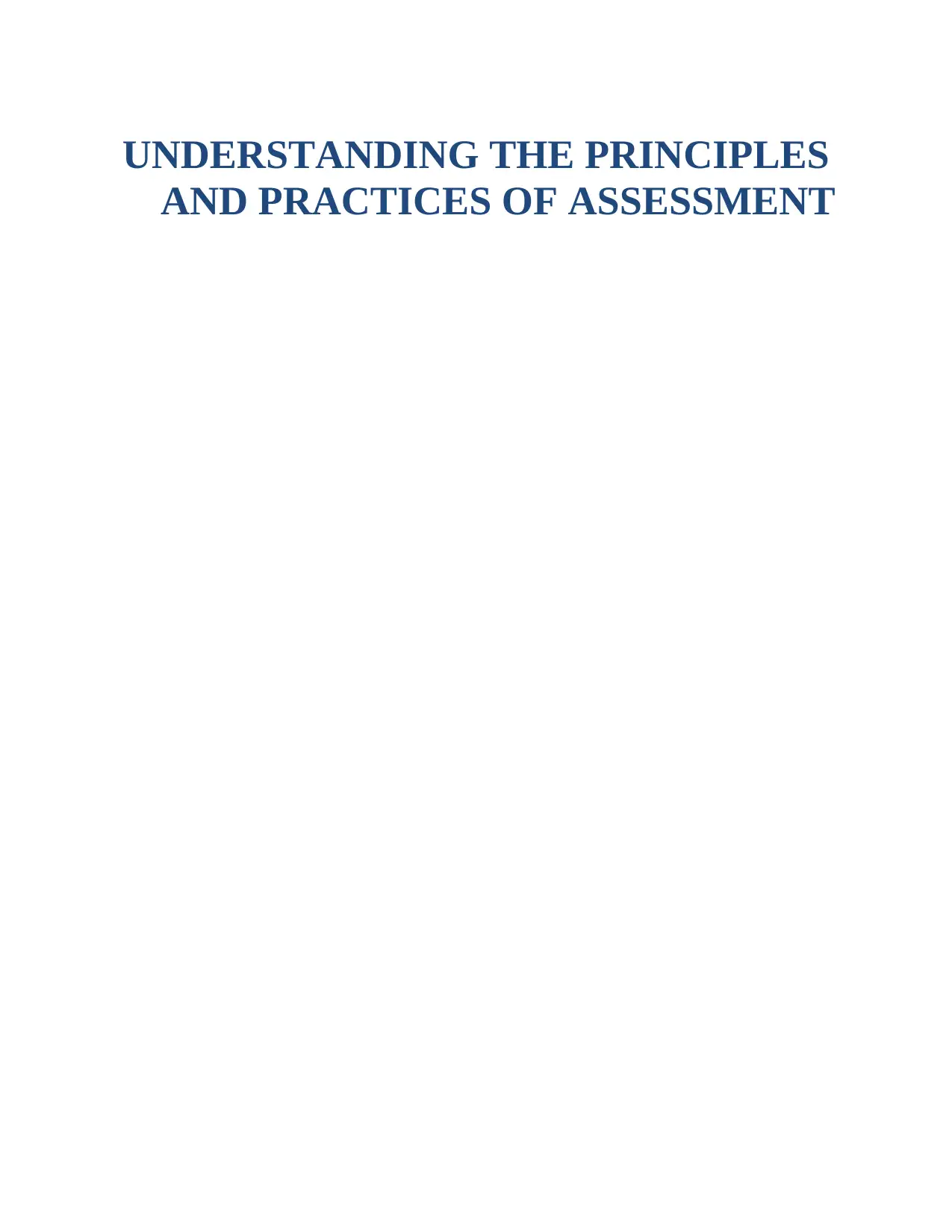
UNDERSTANDING THE PRINCIPLES
AND PRACTICES OF ASSESSMENT
AND PRACTICES OF ASSESSMENT
Paraphrase This Document
Need a fresh take? Get an instant paraphrase of this document with our AI Paraphraser
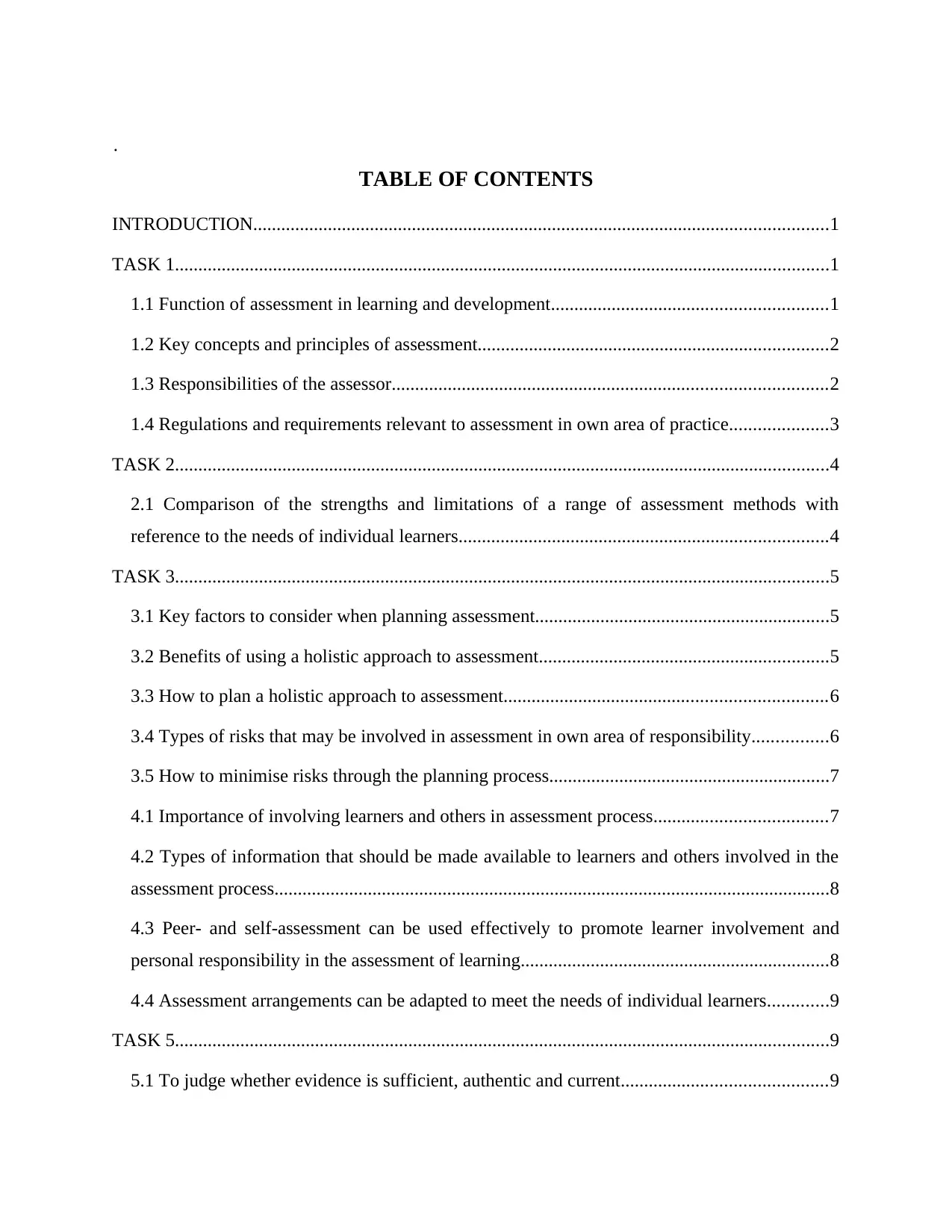
.
TABLE OF CONTENTS
INTRODUCTION...........................................................................................................................1
TASK 1............................................................................................................................................1
1.1 Function of assessment in learning and development...........................................................1
1.2 Key concepts and principles of assessment...........................................................................2
1.3 Responsibilities of the assessor.............................................................................................2
1.4 Regulations and requirements relevant to assessment in own area of practice.....................3
TASK 2............................................................................................................................................4
2.1 Comparison of the strengths and limitations of a range of assessment methods with
reference to the needs of individual learners...............................................................................4
TASK 3............................................................................................................................................5
3.1 Key factors to consider when planning assessment...............................................................5
3.2 Benefits of using a holistic approach to assessment..............................................................5
3.3 How to plan a holistic approach to assessment.....................................................................6
3.4 Types of risks that may be involved in assessment in own area of responsibility................6
3.5 How to minimise risks through the planning process............................................................7
4.1 Importance of involving learners and others in assessment process.....................................7
4.2 Types of information that should be made available to learners and others involved in the
assessment process.......................................................................................................................8
4.3 Peer- and self-assessment can be used effectively to promote learner involvement and
personal responsibility in the assessment of learning..................................................................8
4.4 Assessment arrangements can be adapted to meet the needs of individual learners.............9
TASK 5............................................................................................................................................9
5.1 To judge whether evidence is sufficient, authentic and current............................................9
TABLE OF CONTENTS
INTRODUCTION...........................................................................................................................1
TASK 1............................................................................................................................................1
1.1 Function of assessment in learning and development...........................................................1
1.2 Key concepts and principles of assessment...........................................................................2
1.3 Responsibilities of the assessor.............................................................................................2
1.4 Regulations and requirements relevant to assessment in own area of practice.....................3
TASK 2............................................................................................................................................4
2.1 Comparison of the strengths and limitations of a range of assessment methods with
reference to the needs of individual learners...............................................................................4
TASK 3............................................................................................................................................5
3.1 Key factors to consider when planning assessment...............................................................5
3.2 Benefits of using a holistic approach to assessment..............................................................5
3.3 How to plan a holistic approach to assessment.....................................................................6
3.4 Types of risks that may be involved in assessment in own area of responsibility................6
3.5 How to minimise risks through the planning process............................................................7
4.1 Importance of involving learners and others in assessment process.....................................7
4.2 Types of information that should be made available to learners and others involved in the
assessment process.......................................................................................................................8
4.3 Peer- and self-assessment can be used effectively to promote learner involvement and
personal responsibility in the assessment of learning..................................................................8
4.4 Assessment arrangements can be adapted to meet the needs of individual learners.............9
TASK 5............................................................................................................................................9
5.1 To judge whether evidence is sufficient, authentic and current............................................9
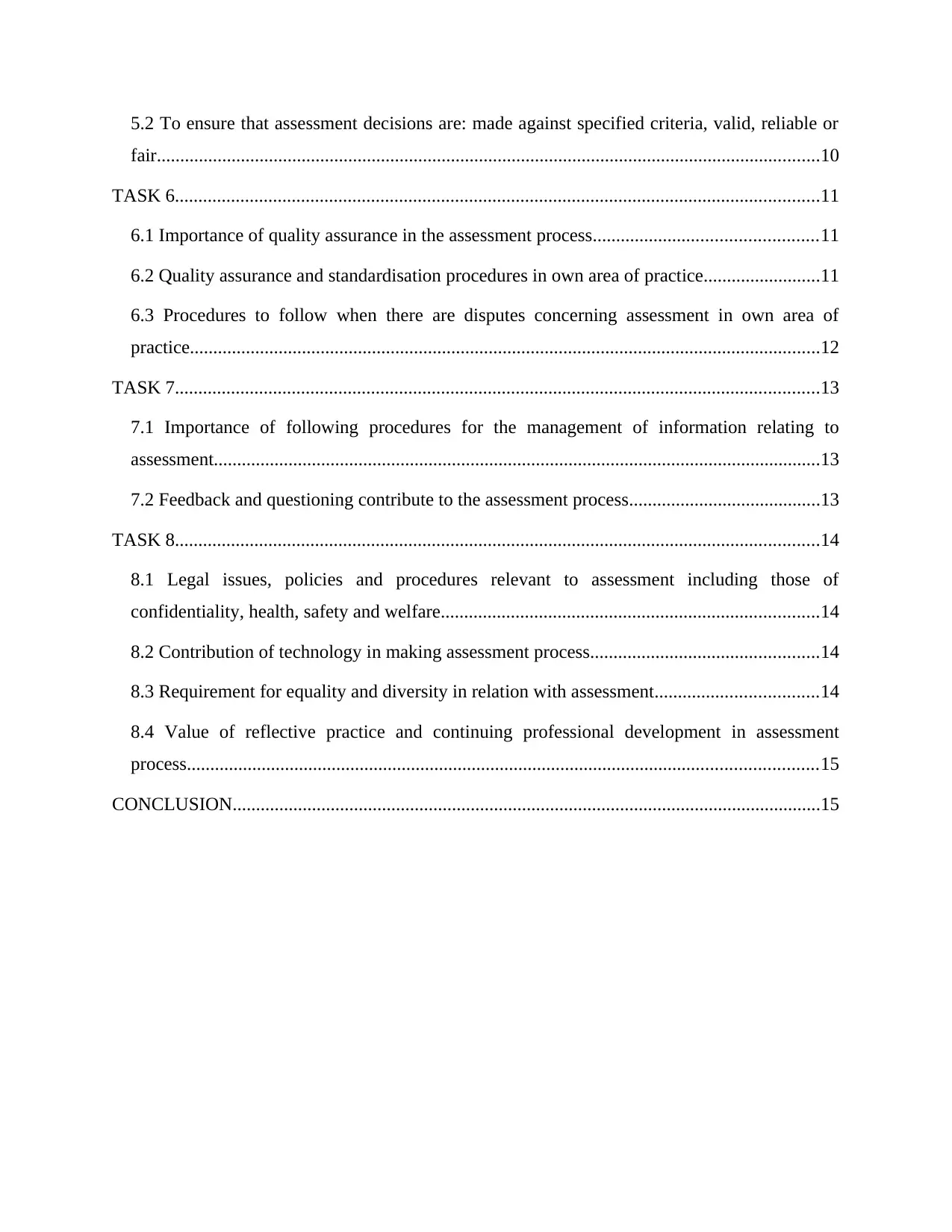
5.2 To ensure that assessment decisions are: made against specified criteria, valid, reliable or
fair..............................................................................................................................................10
TASK 6..........................................................................................................................................11
6.1 Importance of quality assurance in the assessment process................................................11
6.2 Quality assurance and standardisation procedures in own area of practice.........................11
6.3 Procedures to follow when there are disputes concerning assessment in own area of
practice.......................................................................................................................................12
TASK 7..........................................................................................................................................13
7.1 Importance of following procedures for the management of information relating to
assessment..................................................................................................................................13
7.2 Feedback and questioning contribute to the assessment process.........................................13
TASK 8..........................................................................................................................................14
8.1 Legal issues, policies and procedures relevant to assessment including those of
confidentiality, health, safety and welfare.................................................................................14
8.2 Contribution of technology in making assessment process.................................................14
8.3 Requirement for equality and diversity in relation with assessment...................................14
8.4 Value of reflective practice and continuing professional development in assessment
process.......................................................................................................................................15
CONCLUSION..............................................................................................................................15
fair..............................................................................................................................................10
TASK 6..........................................................................................................................................11
6.1 Importance of quality assurance in the assessment process................................................11
6.2 Quality assurance and standardisation procedures in own area of practice.........................11
6.3 Procedures to follow when there are disputes concerning assessment in own area of
practice.......................................................................................................................................12
TASK 7..........................................................................................................................................13
7.1 Importance of following procedures for the management of information relating to
assessment..................................................................................................................................13
7.2 Feedback and questioning contribute to the assessment process.........................................13
TASK 8..........................................................................................................................................14
8.1 Legal issues, policies and procedures relevant to assessment including those of
confidentiality, health, safety and welfare.................................................................................14
8.2 Contribution of technology in making assessment process.................................................14
8.3 Requirement for equality and diversity in relation with assessment...................................14
8.4 Value of reflective practice and continuing professional development in assessment
process.......................................................................................................................................15
CONCLUSION..............................................................................................................................15
⊘ This is a preview!⊘
Do you want full access?
Subscribe today to unlock all pages.

Trusted by 1+ million students worldwide
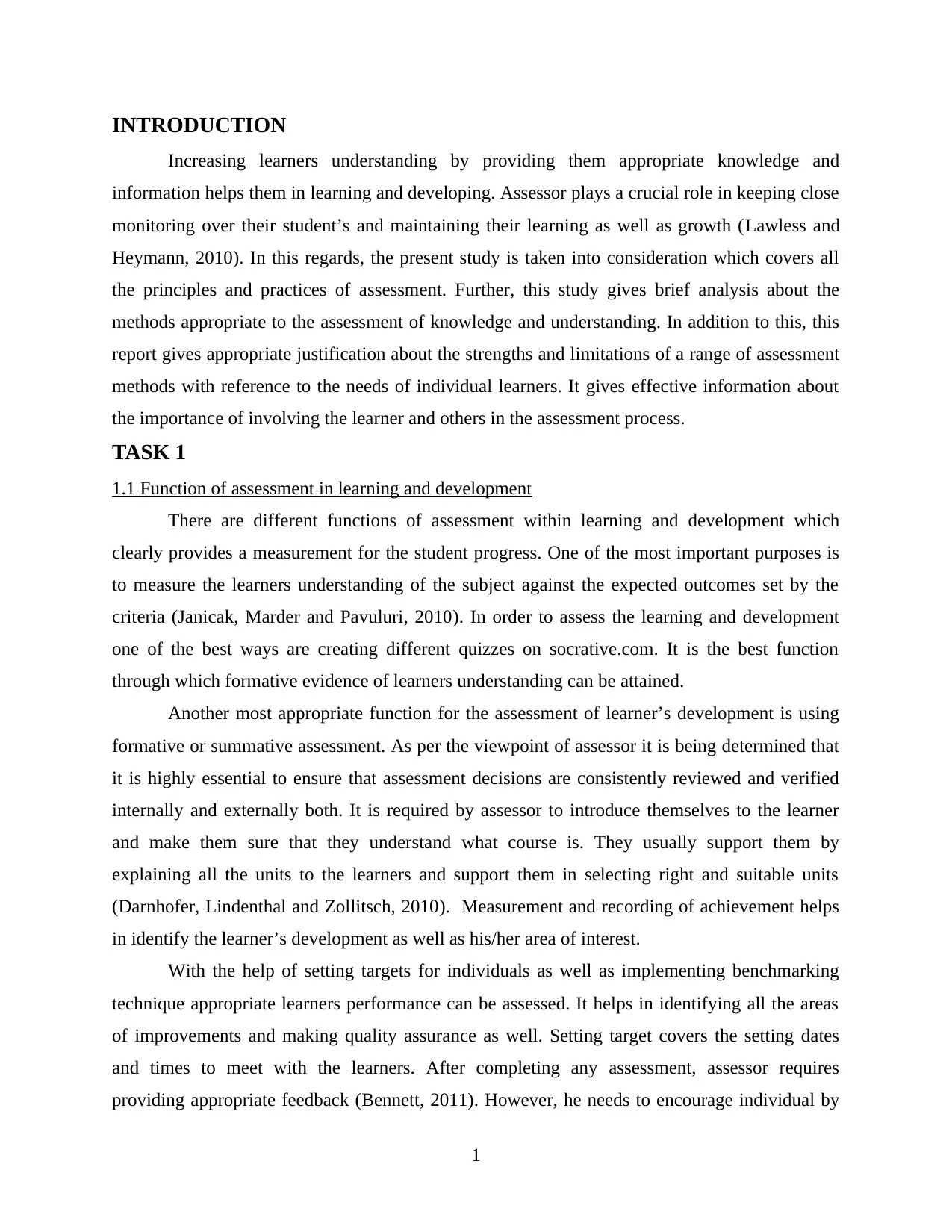
INTRODUCTION
Increasing learners understanding by providing them appropriate knowledge and
information helps them in learning and developing. Assessor plays a crucial role in keeping close
monitoring over their student’s and maintaining their learning as well as growth (Lawless and
Heymann, 2010). In this regards, the present study is taken into consideration which covers all
the principles and practices of assessment. Further, this study gives brief analysis about the
methods appropriate to the assessment of knowledge and understanding. In addition to this, this
report gives appropriate justification about the strengths and limitations of a range of assessment
methods with reference to the needs of individual learners. It gives effective information about
the importance of involving the learner and others in the assessment process.
TASK 1
1.1 Function of assessment in learning and development
There are different functions of assessment within learning and development which
clearly provides a measurement for the student progress. One of the most important purposes is
to measure the learners understanding of the subject against the expected outcomes set by the
criteria (Janicak, Marder and Pavuluri, 2010). In order to assess the learning and development
one of the best ways are creating different quizzes on socrative.com. It is the best function
through which formative evidence of learners understanding can be attained.
Another most appropriate function for the assessment of learner’s development is using
formative or summative assessment. As per the viewpoint of assessor it is being determined that
it is highly essential to ensure that assessment decisions are consistently reviewed and verified
internally and externally both. It is required by assessor to introduce themselves to the learner
and make them sure that they understand what course is. They usually support them by
explaining all the units to the learners and support them in selecting right and suitable units
(Darnhofer, Lindenthal and Zollitsch, 2010). Measurement and recording of achievement helps
in identify the learner’s development as well as his/her area of interest.
With the help of setting targets for individuals as well as implementing benchmarking
technique appropriate learners performance can be assessed. It helps in identifying all the areas
of improvements and making quality assurance as well. Setting target covers the setting dates
and times to meet with the learners. After completing any assessment, assessor requires
providing appropriate feedback (Bennett, 2011). However, he needs to encourage individual by
1
Increasing learners understanding by providing them appropriate knowledge and
information helps them in learning and developing. Assessor plays a crucial role in keeping close
monitoring over their student’s and maintaining their learning as well as growth (Lawless and
Heymann, 2010). In this regards, the present study is taken into consideration which covers all
the principles and practices of assessment. Further, this study gives brief analysis about the
methods appropriate to the assessment of knowledge and understanding. In addition to this, this
report gives appropriate justification about the strengths and limitations of a range of assessment
methods with reference to the needs of individual learners. It gives effective information about
the importance of involving the learner and others in the assessment process.
TASK 1
1.1 Function of assessment in learning and development
There are different functions of assessment within learning and development which
clearly provides a measurement for the student progress. One of the most important purposes is
to measure the learners understanding of the subject against the expected outcomes set by the
criteria (Janicak, Marder and Pavuluri, 2010). In order to assess the learning and development
one of the best ways are creating different quizzes on socrative.com. It is the best function
through which formative evidence of learners understanding can be attained.
Another most appropriate function for the assessment of learner’s development is using
formative or summative assessment. As per the viewpoint of assessor it is being determined that
it is highly essential to ensure that assessment decisions are consistently reviewed and verified
internally and externally both. It is required by assessor to introduce themselves to the learner
and make them sure that they understand what course is. They usually support them by
explaining all the units to the learners and support them in selecting right and suitable units
(Darnhofer, Lindenthal and Zollitsch, 2010). Measurement and recording of achievement helps
in identify the learner’s development as well as his/her area of interest.
With the help of setting targets for individuals as well as implementing benchmarking
technique appropriate learners performance can be assessed. It helps in identifying all the areas
of improvements and making quality assurance as well. Setting target covers the setting dates
and times to meet with the learners. After completing any assessment, assessor requires
providing appropriate feedback (Bennett, 2011). However, he needs to encourage individual by
1
Paraphrase This Document
Need a fresh take? Get an instant paraphrase of this document with our AI Paraphraser
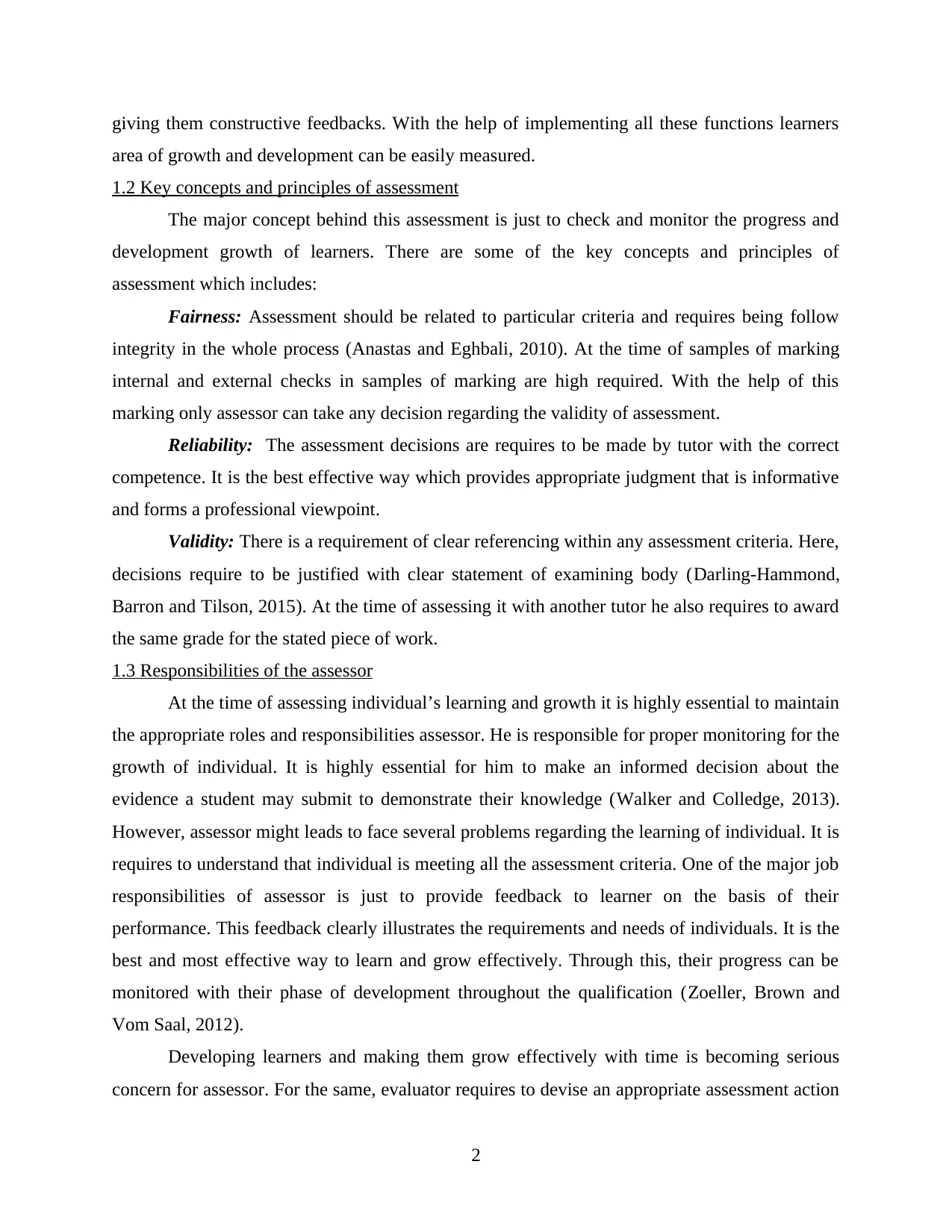
giving them constructive feedbacks. With the help of implementing all these functions learners
area of growth and development can be easily measured.
1.2 Key concepts and principles of assessment
The major concept behind this assessment is just to check and monitor the progress and
development growth of learners. There are some of the key concepts and principles of
assessment which includes:
Fairness: Assessment should be related to particular criteria and requires being follow
integrity in the whole process (Anastas and Eghbali, 2010). At the time of samples of marking
internal and external checks in samples of marking are high required. With the help of this
marking only assessor can take any decision regarding the validity of assessment.
Reliability: The assessment decisions are requires to be made by tutor with the correct
competence. It is the best effective way which provides appropriate judgment that is informative
and forms a professional viewpoint.
Validity: There is a requirement of clear referencing within any assessment criteria. Here,
decisions require to be justified with clear statement of examining body (Darling-Hammond,
Barron and Tilson, 2015). At the time of assessing it with another tutor he also requires to award
the same grade for the stated piece of work.
1.3 Responsibilities of the assessor
At the time of assessing individual’s learning and growth it is highly essential to maintain
the appropriate roles and responsibilities assessor. He is responsible for proper monitoring for the
growth of individual. It is highly essential for him to make an informed decision about the
evidence a student may submit to demonstrate their knowledge (Walker and Colledge, 2013).
However, assessor might leads to face several problems regarding the learning of individual. It is
requires to understand that individual is meeting all the assessment criteria. One of the major job
responsibilities of assessor is just to provide feedback to learner on the basis of their
performance. This feedback clearly illustrates the requirements and needs of individuals. It is the
best and most effective way to learn and grow effectively. Through this, their progress can be
monitored with their phase of development throughout the qualification (Zoeller, Brown and
Vom Saal, 2012).
Developing learners and making them grow effectively with time is becoming serious
concern for assessor. For the same, evaluator requires to devise an appropriate assessment action
2
area of growth and development can be easily measured.
1.2 Key concepts and principles of assessment
The major concept behind this assessment is just to check and monitor the progress and
development growth of learners. There are some of the key concepts and principles of
assessment which includes:
Fairness: Assessment should be related to particular criteria and requires being follow
integrity in the whole process (Anastas and Eghbali, 2010). At the time of samples of marking
internal and external checks in samples of marking are high required. With the help of this
marking only assessor can take any decision regarding the validity of assessment.
Reliability: The assessment decisions are requires to be made by tutor with the correct
competence. It is the best effective way which provides appropriate judgment that is informative
and forms a professional viewpoint.
Validity: There is a requirement of clear referencing within any assessment criteria. Here,
decisions require to be justified with clear statement of examining body (Darling-Hammond,
Barron and Tilson, 2015). At the time of assessing it with another tutor he also requires to award
the same grade for the stated piece of work.
1.3 Responsibilities of the assessor
At the time of assessing individual’s learning and growth it is highly essential to maintain
the appropriate roles and responsibilities assessor. He is responsible for proper monitoring for the
growth of individual. It is highly essential for him to make an informed decision about the
evidence a student may submit to demonstrate their knowledge (Walker and Colledge, 2013).
However, assessor might leads to face several problems regarding the learning of individual. It is
requires to understand that individual is meeting all the assessment criteria. One of the major job
responsibilities of assessor is just to provide feedback to learner on the basis of their
performance. This feedback clearly illustrates the requirements and needs of individuals. It is the
best and most effective way to learn and grow effectively. Through this, their progress can be
monitored with their phase of development throughout the qualification (Zoeller, Brown and
Vom Saal, 2012).
Developing learners and making them grow effectively with time is becoming serious
concern for assessor. For the same, evaluator requires to devise an appropriate assessment action
2
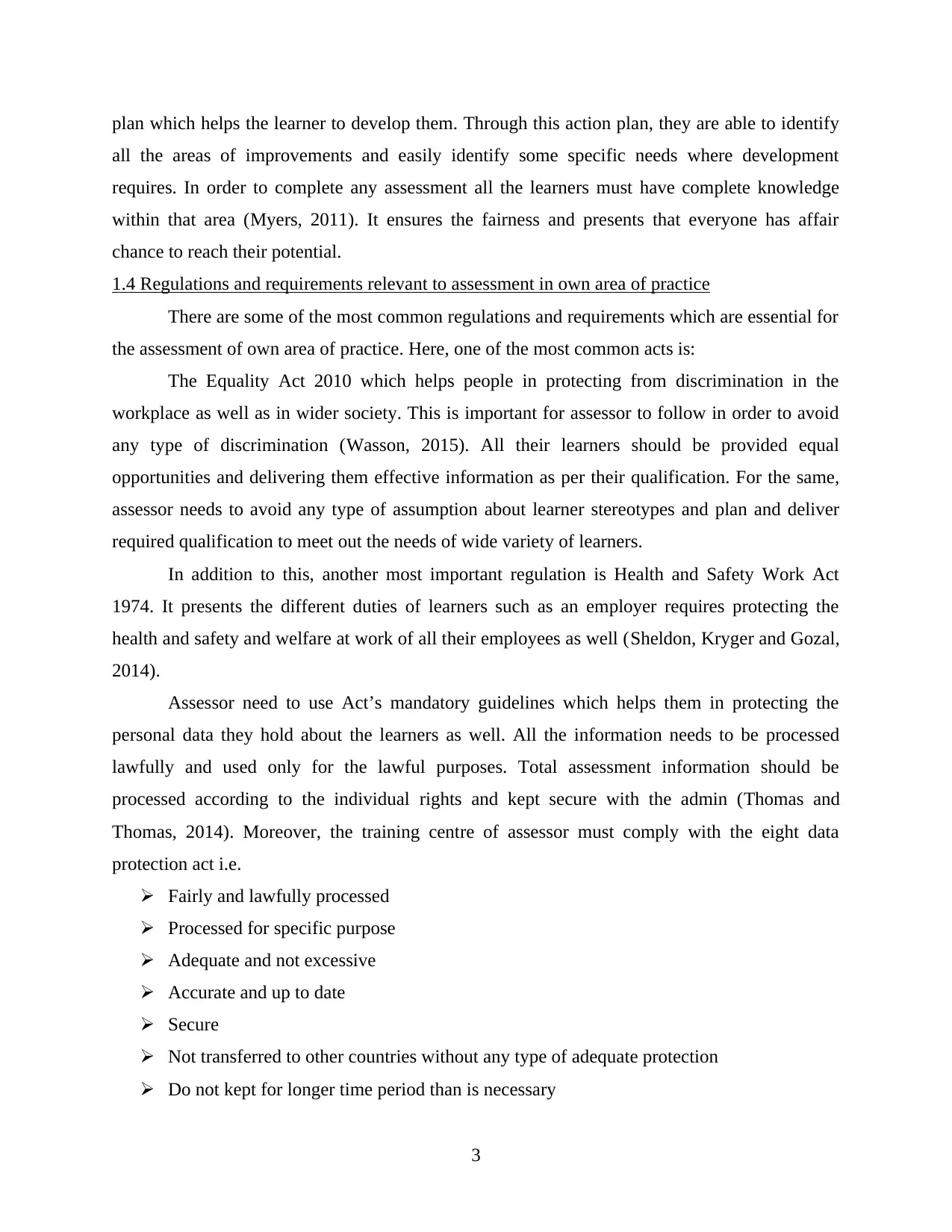
plan which helps the learner to develop them. Through this action plan, they are able to identify
all the areas of improvements and easily identify some specific needs where development
requires. In order to complete any assessment all the learners must have complete knowledge
within that area (Myers, 2011). It ensures the fairness and presents that everyone has affair
chance to reach their potential.
1.4 Regulations and requirements relevant to assessment in own area of practice
There are some of the most common regulations and requirements which are essential for
the assessment of own area of practice. Here, one of the most common acts is:
The Equality Act 2010 which helps people in protecting from discrimination in the
workplace as well as in wider society. This is important for assessor to follow in order to avoid
any type of discrimination (Wasson, 2015). All their learners should be provided equal
opportunities and delivering them effective information as per their qualification. For the same,
assessor needs to avoid any type of assumption about learner stereotypes and plan and deliver
required qualification to meet out the needs of wide variety of learners.
In addition to this, another most important regulation is Health and Safety Work Act
1974. It presents the different duties of learners such as an employer requires protecting the
health and safety and welfare at work of all their employees as well (Sheldon, Kryger and Gozal,
2014).
Assessor need to use Act’s mandatory guidelines which helps them in protecting the
personal data they hold about the learners as well. All the information needs to be processed
lawfully and used only for the lawful purposes. Total assessment information should be
processed according to the individual rights and kept secure with the admin (Thomas and
Thomas, 2014). Moreover, the training centre of assessor must comply with the eight data
protection act i.e.
Fairly and lawfully processed
Processed for specific purpose
Adequate and not excessive
Accurate and up to date
Secure
Not transferred to other countries without any type of adequate protection
Do not kept for longer time period than is necessary
3
all the areas of improvements and easily identify some specific needs where development
requires. In order to complete any assessment all the learners must have complete knowledge
within that area (Myers, 2011). It ensures the fairness and presents that everyone has affair
chance to reach their potential.
1.4 Regulations and requirements relevant to assessment in own area of practice
There are some of the most common regulations and requirements which are essential for
the assessment of own area of practice. Here, one of the most common acts is:
The Equality Act 2010 which helps people in protecting from discrimination in the
workplace as well as in wider society. This is important for assessor to follow in order to avoid
any type of discrimination (Wasson, 2015). All their learners should be provided equal
opportunities and delivering them effective information as per their qualification. For the same,
assessor needs to avoid any type of assumption about learner stereotypes and plan and deliver
required qualification to meet out the needs of wide variety of learners.
In addition to this, another most important regulation is Health and Safety Work Act
1974. It presents the different duties of learners such as an employer requires protecting the
health and safety and welfare at work of all their employees as well (Sheldon, Kryger and Gozal,
2014).
Assessor need to use Act’s mandatory guidelines which helps them in protecting the
personal data they hold about the learners as well. All the information needs to be processed
lawfully and used only for the lawful purposes. Total assessment information should be
processed according to the individual rights and kept secure with the admin (Thomas and
Thomas, 2014). Moreover, the training centre of assessor must comply with the eight data
protection act i.e.
Fairly and lawfully processed
Processed for specific purpose
Adequate and not excessive
Accurate and up to date
Secure
Not transferred to other countries without any type of adequate protection
Do not kept for longer time period than is necessary
3
⊘ This is a preview!⊘
Do you want full access?
Subscribe today to unlock all pages.

Trusted by 1+ million students worldwide
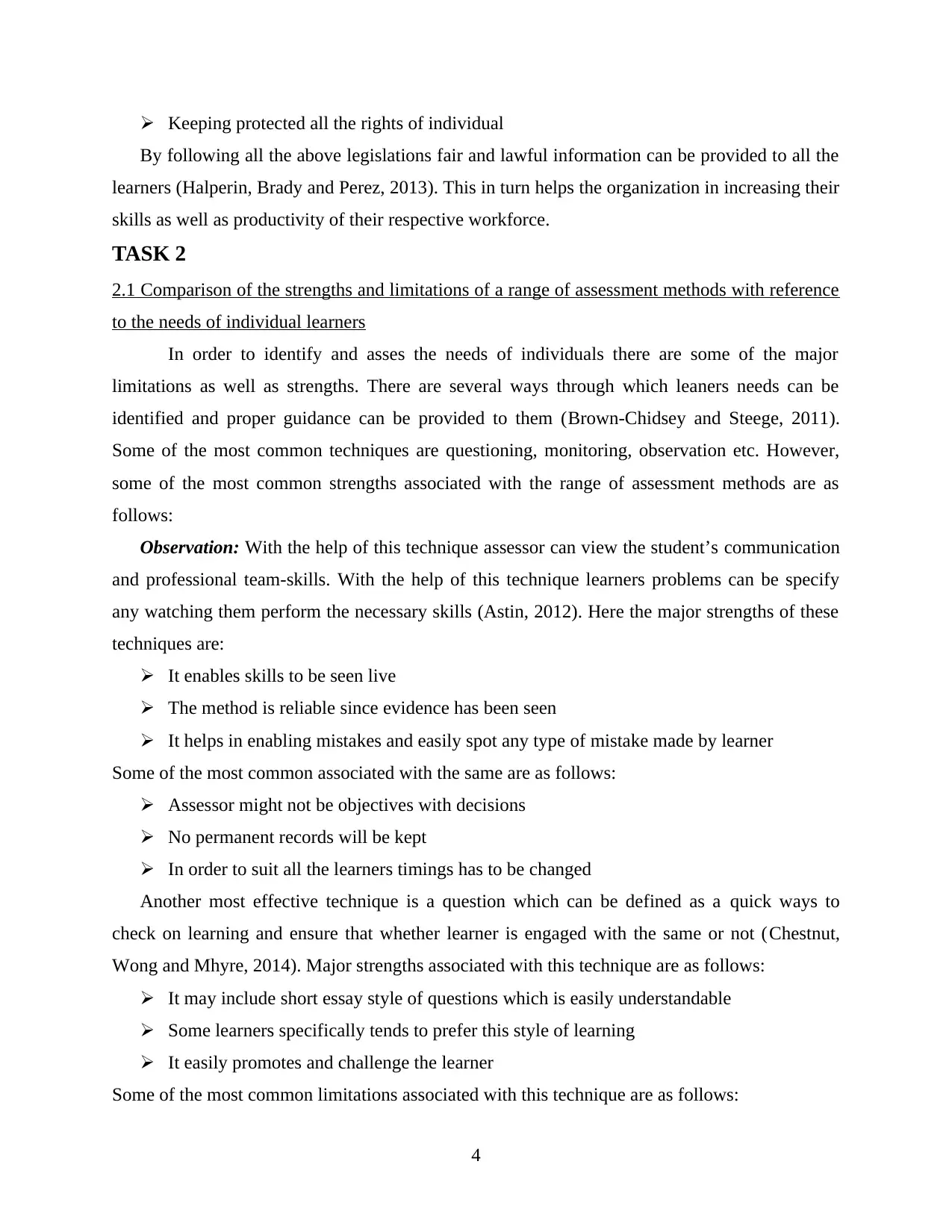
Keeping protected all the rights of individual
By following all the above legislations fair and lawful information can be provided to all the
learners (Halperin, Brady and Perez, 2013). This in turn helps the organization in increasing their
skills as well as productivity of their respective workforce.
TASK 2
2.1 Comparison of the strengths and limitations of a range of assessment methods with reference
to the needs of individual learners
In order to identify and asses the needs of individuals there are some of the major
limitations as well as strengths. There are several ways through which leaners needs can be
identified and proper guidance can be provided to them (Brown-Chidsey and Steege, 2011).
Some of the most common techniques are questioning, monitoring, observation etc. However,
some of the most common strengths associated with the range of assessment methods are as
follows:
Observation: With the help of this technique assessor can view the student’s communication
and professional team-skills. With the help of this technique learners problems can be specify
any watching them perform the necessary skills (Astin, 2012). Here the major strengths of these
techniques are:
It enables skills to be seen live
The method is reliable since evidence has been seen
It helps in enabling mistakes and easily spot any type of mistake made by learner
Some of the most common associated with the same are as follows:
Assessor might not be objectives with decisions
No permanent records will be kept
In order to suit all the learners timings has to be changed
Another most effective technique is a question which can be defined as a quick ways to
check on learning and ensure that whether learner is engaged with the same or not (Chestnut,
Wong and Mhyre, 2014). Major strengths associated with this technique are as follows:
It may include short essay style of questions which is easily understandable
Some learners specifically tends to prefer this style of learning
It easily promotes and challenge the learner
Some of the most common limitations associated with this technique are as follows:
4
By following all the above legislations fair and lawful information can be provided to all the
learners (Halperin, Brady and Perez, 2013). This in turn helps the organization in increasing their
skills as well as productivity of their respective workforce.
TASK 2
2.1 Comparison of the strengths and limitations of a range of assessment methods with reference
to the needs of individual learners
In order to identify and asses the needs of individuals there are some of the major
limitations as well as strengths. There are several ways through which leaners needs can be
identified and proper guidance can be provided to them (Brown-Chidsey and Steege, 2011).
Some of the most common techniques are questioning, monitoring, observation etc. However,
some of the most common strengths associated with the range of assessment methods are as
follows:
Observation: With the help of this technique assessor can view the student’s communication
and professional team-skills. With the help of this technique learners problems can be specify
any watching them perform the necessary skills (Astin, 2012). Here the major strengths of these
techniques are:
It enables skills to be seen live
The method is reliable since evidence has been seen
It helps in enabling mistakes and easily spot any type of mistake made by learner
Some of the most common associated with the same are as follows:
Assessor might not be objectives with decisions
No permanent records will be kept
In order to suit all the learners timings has to be changed
Another most effective technique is a question which can be defined as a quick ways to
check on learning and ensure that whether learner is engaged with the same or not (Chestnut,
Wong and Mhyre, 2014). Major strengths associated with this technique are as follows:
It may include short essay style of questions which is easily understandable
Some learners specifically tends to prefer this style of learning
It easily promotes and challenge the learner
Some of the most common limitations associated with this technique are as follows:
4
Paraphrase This Document
Need a fresh take? Get an instant paraphrase of this document with our AI Paraphraser
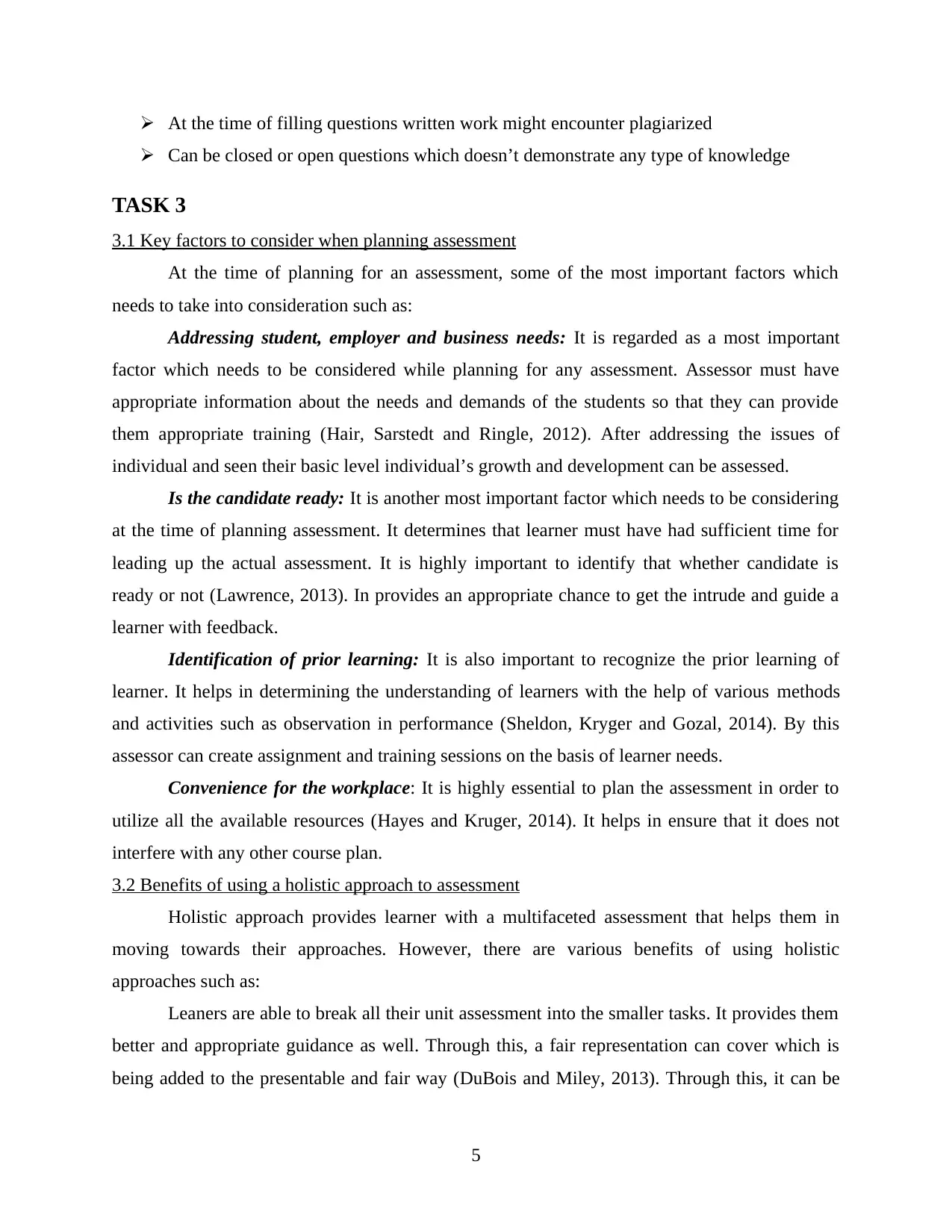
At the time of filling questions written work might encounter plagiarized
Can be closed or open questions which doesn’t demonstrate any type of knowledge
TASK 3
3.1 Key factors to consider when planning assessment
At the time of planning for an assessment, some of the most important factors which
needs to take into consideration such as:
Addressing student, employer and business needs: It is regarded as a most important
factor which needs to be considered while planning for any assessment. Assessor must have
appropriate information about the needs and demands of the students so that they can provide
them appropriate training (Hair, Sarstedt and Ringle, 2012). After addressing the issues of
individual and seen their basic level individual’s growth and development can be assessed.
Is the candidate ready: It is another most important factor which needs to be considering
at the time of planning assessment. It determines that learner must have had sufficient time for
leading up the actual assessment. It is highly important to identify that whether candidate is
ready or not (Lawrence, 2013). In provides an appropriate chance to get the intrude and guide a
learner with feedback.
Identification of prior learning: It is also important to recognize the prior learning of
learner. It helps in determining the understanding of learners with the help of various methods
and activities such as observation in performance (Sheldon, Kryger and Gozal, 2014). By this
assessor can create assignment and training sessions on the basis of learner needs.
Convenience for the workplace: It is highly essential to plan the assessment in order to
utilize all the available resources (Hayes and Kruger, 2014). It helps in ensure that it does not
interfere with any other course plan.
3.2 Benefits of using a holistic approach to assessment
Holistic approach provides learner with a multifaceted assessment that helps them in
moving towards their approaches. However, there are various benefits of using holistic
approaches such as:
Leaners are able to break all their unit assessment into the smaller tasks. It provides them
better and appropriate guidance as well. Through this, a fair representation can cover which is
being added to the presentable and fair way (DuBois and Miley, 2013). Through this, it can be
5
Can be closed or open questions which doesn’t demonstrate any type of knowledge
TASK 3
3.1 Key factors to consider when planning assessment
At the time of planning for an assessment, some of the most important factors which
needs to take into consideration such as:
Addressing student, employer and business needs: It is regarded as a most important
factor which needs to be considered while planning for any assessment. Assessor must have
appropriate information about the needs and demands of the students so that they can provide
them appropriate training (Hair, Sarstedt and Ringle, 2012). After addressing the issues of
individual and seen their basic level individual’s growth and development can be assessed.
Is the candidate ready: It is another most important factor which needs to be considering
at the time of planning assessment. It determines that learner must have had sufficient time for
leading up the actual assessment. It is highly important to identify that whether candidate is
ready or not (Lawrence, 2013). In provides an appropriate chance to get the intrude and guide a
learner with feedback.
Identification of prior learning: It is also important to recognize the prior learning of
learner. It helps in determining the understanding of learners with the help of various methods
and activities such as observation in performance (Sheldon, Kryger and Gozal, 2014). By this
assessor can create assignment and training sessions on the basis of learner needs.
Convenience for the workplace: It is highly essential to plan the assessment in order to
utilize all the available resources (Hayes and Kruger, 2014). It helps in ensure that it does not
interfere with any other course plan.
3.2 Benefits of using a holistic approach to assessment
Holistic approach provides learner with a multifaceted assessment that helps them in
moving towards their approaches. However, there are various benefits of using holistic
approaches such as:
Leaners are able to break all their unit assessment into the smaller tasks. It provides them
better and appropriate guidance as well. Through this, a fair representation can cover which is
being added to the presentable and fair way (DuBois and Miley, 2013). Through this, it can be
5
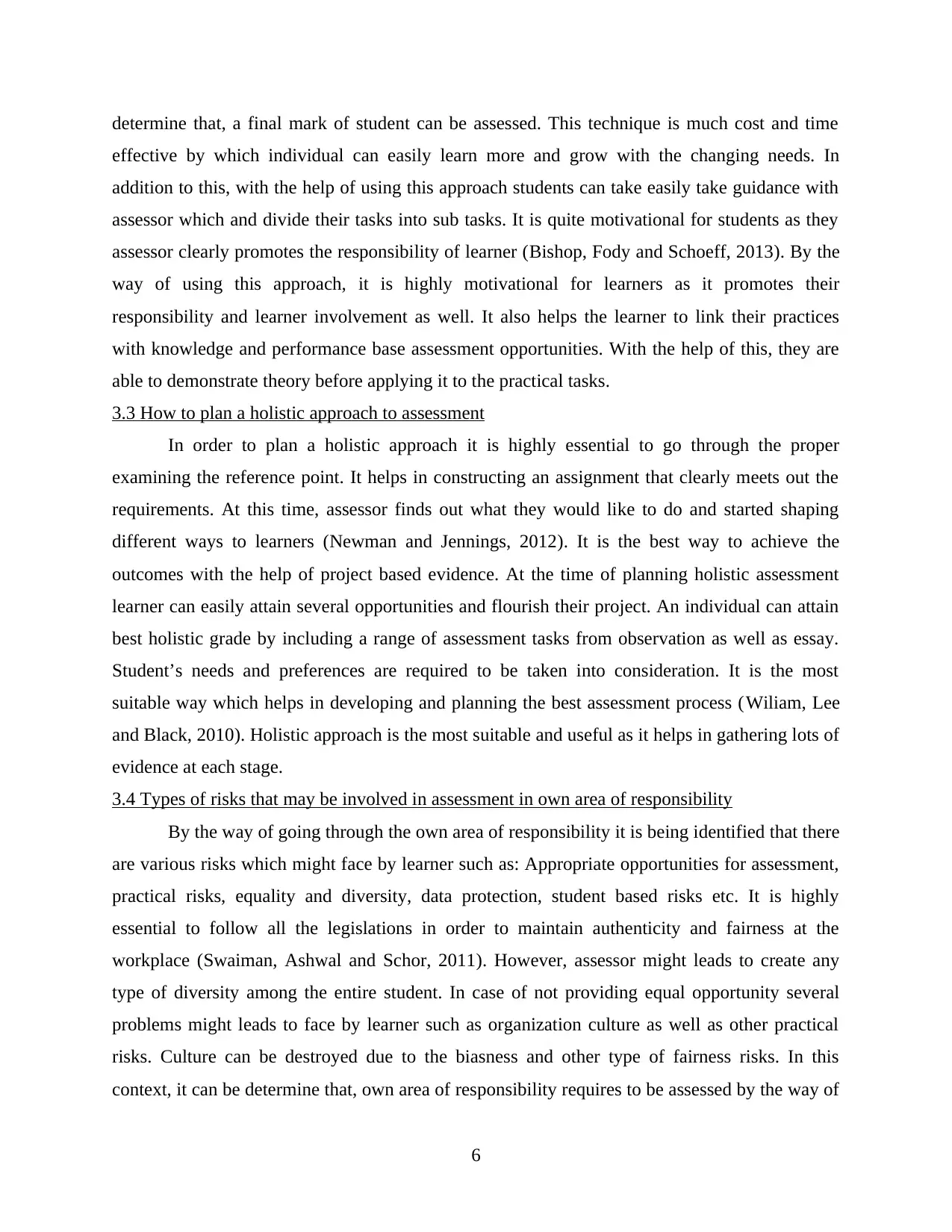
determine that, a final mark of student can be assessed. This technique is much cost and time
effective by which individual can easily learn more and grow with the changing needs. In
addition to this, with the help of using this approach students can take easily take guidance with
assessor which and divide their tasks into sub tasks. It is quite motivational for students as they
assessor clearly promotes the responsibility of learner (Bishop, Fody and Schoeff, 2013). By the
way of using this approach, it is highly motivational for learners as it promotes their
responsibility and learner involvement as well. It also helps the learner to link their practices
with knowledge and performance base assessment opportunities. With the help of this, they are
able to demonstrate theory before applying it to the practical tasks.
3.3 How to plan a holistic approach to assessment
In order to plan a holistic approach it is highly essential to go through the proper
examining the reference point. It helps in constructing an assignment that clearly meets out the
requirements. At this time, assessor finds out what they would like to do and started shaping
different ways to learners (Newman and Jennings, 2012). It is the best way to achieve the
outcomes with the help of project based evidence. At the time of planning holistic assessment
learner can easily attain several opportunities and flourish their project. An individual can attain
best holistic grade by including a range of assessment tasks from observation as well as essay.
Student’s needs and preferences are required to be taken into consideration. It is the most
suitable way which helps in developing and planning the best assessment process (Wiliam, Lee
and Black, 2010). Holistic approach is the most suitable and useful as it helps in gathering lots of
evidence at each stage.
3.4 Types of risks that may be involved in assessment in own area of responsibility
By the way of going through the own area of responsibility it is being identified that there
are various risks which might face by learner such as: Appropriate opportunities for assessment,
practical risks, equality and diversity, data protection, student based risks etc. It is highly
essential to follow all the legislations in order to maintain authenticity and fairness at the
workplace (Swaiman, Ashwal and Schor, 2011). However, assessor might leads to create any
type of diversity among the entire student. In case of not providing equal opportunity several
problems might leads to face by learner such as organization culture as well as other practical
risks. Culture can be destroyed due to the biasness and other type of fairness risks. In this
context, it can be determine that, own area of responsibility requires to be assessed by the way of
6
effective by which individual can easily learn more and grow with the changing needs. In
addition to this, with the help of using this approach students can take easily take guidance with
assessor which and divide their tasks into sub tasks. It is quite motivational for students as they
assessor clearly promotes the responsibility of learner (Bishop, Fody and Schoeff, 2013). By the
way of using this approach, it is highly motivational for learners as it promotes their
responsibility and learner involvement as well. It also helps the learner to link their practices
with knowledge and performance base assessment opportunities. With the help of this, they are
able to demonstrate theory before applying it to the practical tasks.
3.3 How to plan a holistic approach to assessment
In order to plan a holistic approach it is highly essential to go through the proper
examining the reference point. It helps in constructing an assignment that clearly meets out the
requirements. At this time, assessor finds out what they would like to do and started shaping
different ways to learners (Newman and Jennings, 2012). It is the best way to achieve the
outcomes with the help of project based evidence. At the time of planning holistic assessment
learner can easily attain several opportunities and flourish their project. An individual can attain
best holistic grade by including a range of assessment tasks from observation as well as essay.
Student’s needs and preferences are required to be taken into consideration. It is the most
suitable way which helps in developing and planning the best assessment process (Wiliam, Lee
and Black, 2010). Holistic approach is the most suitable and useful as it helps in gathering lots of
evidence at each stage.
3.4 Types of risks that may be involved in assessment in own area of responsibility
By the way of going through the own area of responsibility it is being identified that there
are various risks which might face by learner such as: Appropriate opportunities for assessment,
practical risks, equality and diversity, data protection, student based risks etc. It is highly
essential to follow all the legislations in order to maintain authenticity and fairness at the
workplace (Swaiman, Ashwal and Schor, 2011). However, assessor might leads to create any
type of diversity among the entire student. In case of not providing equal opportunity several
problems might leads to face by learner such as organization culture as well as other practical
risks. Culture can be destroyed due to the biasness and other type of fairness risks. In this
context, it can be determine that, own area of responsibility requires to be assessed by the way of
6
⊘ This is a preview!⊘
Do you want full access?
Subscribe today to unlock all pages.

Trusted by 1+ million students worldwide
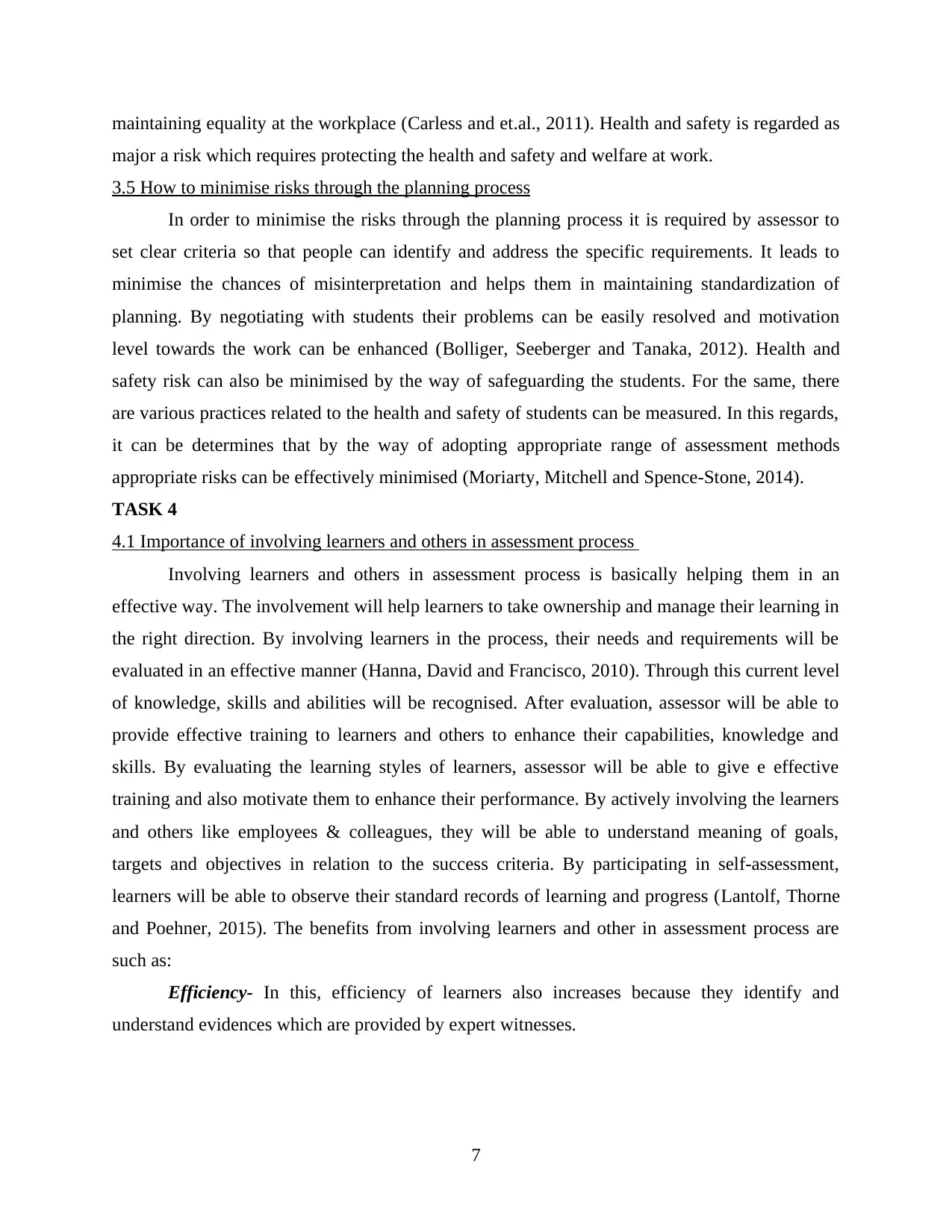
maintaining equality at the workplace (Carless and et.al., 2011). Health and safety is regarded as
major a risk which requires protecting the health and safety and welfare at work.
3.5 How to minimise risks through the planning process
In order to minimise the risks through the planning process it is required by assessor to
set clear criteria so that people can identify and address the specific requirements. It leads to
minimise the chances of misinterpretation and helps them in maintaining standardization of
planning. By negotiating with students their problems can be easily resolved and motivation
level towards the work can be enhanced (Bolliger, Seeberger and Tanaka, 2012). Health and
safety risk can also be minimised by the way of safeguarding the students. For the same, there
are various practices related to the health and safety of students can be measured. In this regards,
it can be determines that by the way of adopting appropriate range of assessment methods
appropriate risks can be effectively minimised (Moriarty, Mitchell and Spence-Stone, 2014).
TASK 4
4.1 Importance of involving learners and others in assessment process
Involving learners and others in assessment process is basically helping them in an
effective way. The involvement will help learners to take ownership and manage their learning in
the right direction. By involving learners in the process, their needs and requirements will be
evaluated in an effective manner (Hanna, David and Francisco, 2010). Through this current level
of knowledge, skills and abilities will be recognised. After evaluation, assessor will be able to
provide effective training to learners and others to enhance their capabilities, knowledge and
skills. By evaluating the learning styles of learners, assessor will be able to give e effective
training and also motivate them to enhance their performance. By actively involving the learners
and others like employees & colleagues, they will be able to understand meaning of goals,
targets and objectives in relation to the success criteria. By participating in self-assessment,
learners will be able to observe their standard records of learning and progress (Lantolf, Thorne
and Poehner, 2015). The benefits from involving learners and other in assessment process are
such as:
Efficiency- In this, efficiency of learners also increases because they identify and
understand evidences which are provided by expert witnesses.
7
major a risk which requires protecting the health and safety and welfare at work.
3.5 How to minimise risks through the planning process
In order to minimise the risks through the planning process it is required by assessor to
set clear criteria so that people can identify and address the specific requirements. It leads to
minimise the chances of misinterpretation and helps them in maintaining standardization of
planning. By negotiating with students their problems can be easily resolved and motivation
level towards the work can be enhanced (Bolliger, Seeberger and Tanaka, 2012). Health and
safety risk can also be minimised by the way of safeguarding the students. For the same, there
are various practices related to the health and safety of students can be measured. In this regards,
it can be determines that by the way of adopting appropriate range of assessment methods
appropriate risks can be effectively minimised (Moriarty, Mitchell and Spence-Stone, 2014).
TASK 4
4.1 Importance of involving learners and others in assessment process
Involving learners and others in assessment process is basically helping them in an
effective way. The involvement will help learners to take ownership and manage their learning in
the right direction. By involving learners in the process, their needs and requirements will be
evaluated in an effective manner (Hanna, David and Francisco, 2010). Through this current level
of knowledge, skills and abilities will be recognised. After evaluation, assessor will be able to
provide effective training to learners and others to enhance their capabilities, knowledge and
skills. By evaluating the learning styles of learners, assessor will be able to give e effective
training and also motivate them to enhance their performance. By actively involving the learners
and others like employees & colleagues, they will be able to understand meaning of goals,
targets and objectives in relation to the success criteria. By participating in self-assessment,
learners will be able to observe their standard records of learning and progress (Lantolf, Thorne
and Poehner, 2015). The benefits from involving learners and other in assessment process are
such as:
Efficiency- In this, efficiency of learners also increases because they identify and
understand evidences which are provided by expert witnesses.
7
Paraphrase This Document
Need a fresh take? Get an instant paraphrase of this document with our AI Paraphraser
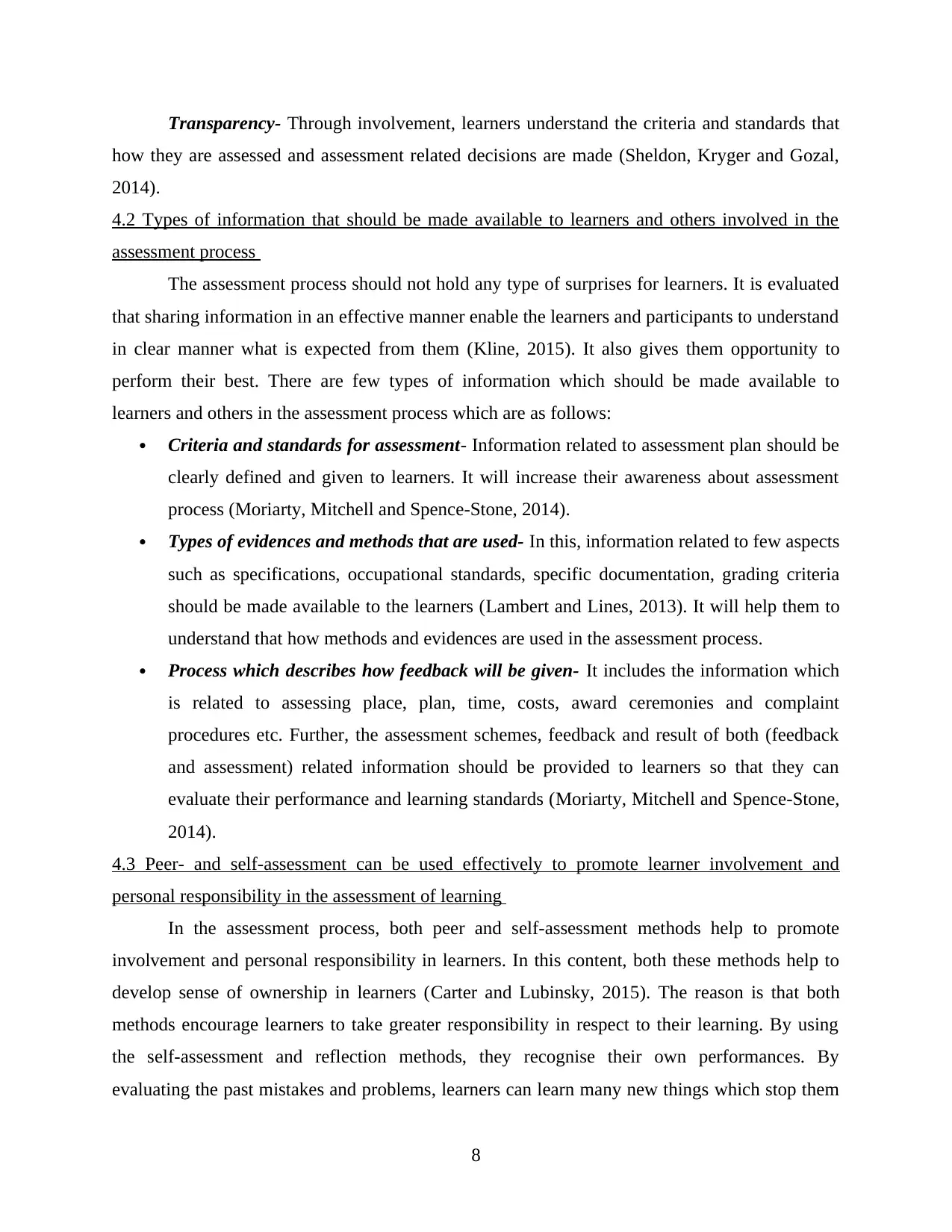
Transparency- Through involvement, learners understand the criteria and standards that
how they are assessed and assessment related decisions are made (Sheldon, Kryger and Gozal,
2014).
4.2 Types of information that should be made available to learners and others involved in the
assessment process
The assessment process should not hold any type of surprises for learners. It is evaluated
that sharing information in an effective manner enable the learners and participants to understand
in clear manner what is expected from them (Kline, 2015). It also gives them opportunity to
perform their best. There are few types of information which should be made available to
learners and others in the assessment process which are as follows:
Criteria and standards for assessment- Information related to assessment plan should be
clearly defined and given to learners. It will increase their awareness about assessment
process (Moriarty, Mitchell and Spence-Stone, 2014).
Types of evidences and methods that are used- In this, information related to few aspects
such as specifications, occupational standards, specific documentation, grading criteria
should be made available to the learners (Lambert and Lines, 2013). It will help them to
understand that how methods and evidences are used in the assessment process.
Process which describes how feedback will be given- It includes the information which
is related to assessing place, plan, time, costs, award ceremonies and complaint
procedures etc. Further, the assessment schemes, feedback and result of both (feedback
and assessment) related information should be provided to learners so that they can
evaluate their performance and learning standards (Moriarty, Mitchell and Spence-Stone,
2014).
4.3 Peer- and self-assessment can be used effectively to promote learner involvement and
personal responsibility in the assessment of learning
In the assessment process, both peer and self-assessment methods help to promote
involvement and personal responsibility in learners. In this content, both these methods help to
develop sense of ownership in learners (Carter and Lubinsky, 2015). The reason is that both
methods encourage learners to take greater responsibility in respect to their learning. By using
the self-assessment and reflection methods, they recognise their own performances. By
evaluating the past mistakes and problems, learners can learn many new things which stop them
8
how they are assessed and assessment related decisions are made (Sheldon, Kryger and Gozal,
2014).
4.2 Types of information that should be made available to learners and others involved in the
assessment process
The assessment process should not hold any type of surprises for learners. It is evaluated
that sharing information in an effective manner enable the learners and participants to understand
in clear manner what is expected from them (Kline, 2015). It also gives them opportunity to
perform their best. There are few types of information which should be made available to
learners and others in the assessment process which are as follows:
Criteria and standards for assessment- Information related to assessment plan should be
clearly defined and given to learners. It will increase their awareness about assessment
process (Moriarty, Mitchell and Spence-Stone, 2014).
Types of evidences and methods that are used- In this, information related to few aspects
such as specifications, occupational standards, specific documentation, grading criteria
should be made available to the learners (Lambert and Lines, 2013). It will help them to
understand that how methods and evidences are used in the assessment process.
Process which describes how feedback will be given- It includes the information which
is related to assessing place, plan, time, costs, award ceremonies and complaint
procedures etc. Further, the assessment schemes, feedback and result of both (feedback
and assessment) related information should be provided to learners so that they can
evaluate their performance and learning standards (Moriarty, Mitchell and Spence-Stone,
2014).
4.3 Peer- and self-assessment can be used effectively to promote learner involvement and
personal responsibility in the assessment of learning
In the assessment process, both peer and self-assessment methods help to promote
involvement and personal responsibility in learners. In this content, both these methods help to
develop sense of ownership in learners (Carter and Lubinsky, 2015). The reason is that both
methods encourage learners to take greater responsibility in respect to their learning. By using
the self-assessment and reflection methods, they recognise their own performances. By
evaluating the past mistakes and problems, learners can learn many new things which stop them
8
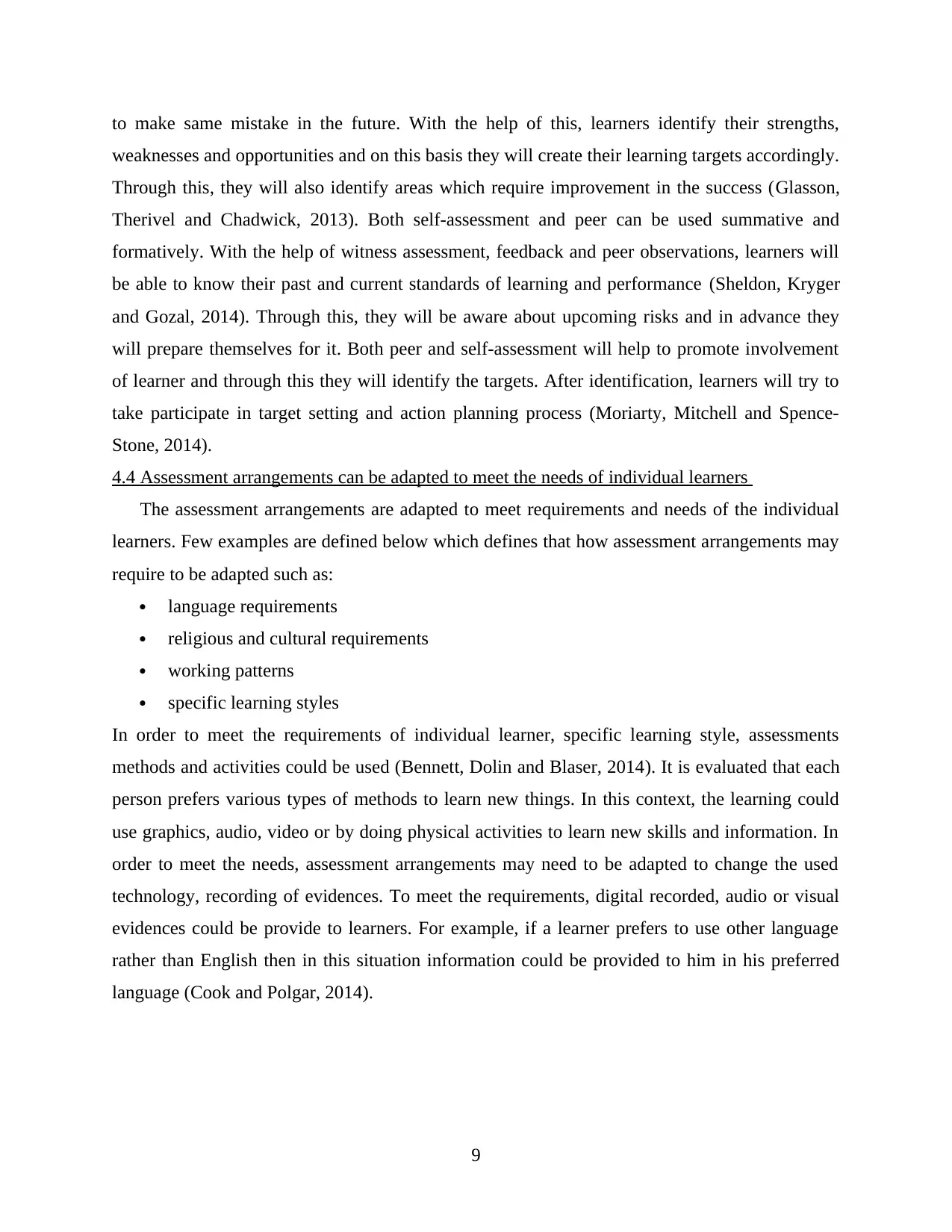
to make same mistake in the future. With the help of this, learners identify their strengths,
weaknesses and opportunities and on this basis they will create their learning targets accordingly.
Through this, they will also identify areas which require improvement in the success (Glasson,
Therivel and Chadwick, 2013). Both self-assessment and peer can be used summative and
formatively. With the help of witness assessment, feedback and peer observations, learners will
be able to know their past and current standards of learning and performance (Sheldon, Kryger
and Gozal, 2014). Through this, they will be aware about upcoming risks and in advance they
will prepare themselves for it. Both peer and self-assessment will help to promote involvement
of learner and through this they will identify the targets. After identification, learners will try to
take participate in target setting and action planning process (Moriarty, Mitchell and Spence-
Stone, 2014).
4.4 Assessment arrangements can be adapted to meet the needs of individual learners
The assessment arrangements are adapted to meet requirements and needs of the individual
learners. Few examples are defined below which defines that how assessment arrangements may
require to be adapted such as:
language requirements
religious and cultural requirements
working patterns
specific learning styles
In order to meet the requirements of individual learner, specific learning style, assessments
methods and activities could be used (Bennett, Dolin and Blaser, 2014). It is evaluated that each
person prefers various types of methods to learn new things. In this context, the learning could
use graphics, audio, video or by doing physical activities to learn new skills and information. In
order to meet the needs, assessment arrangements may need to be adapted to change the used
technology, recording of evidences. To meet the requirements, digital recorded, audio or visual
evidences could be provide to learners. For example, if a learner prefers to use other language
rather than English then in this situation information could be provided to him in his preferred
language (Cook and Polgar, 2014).
9
weaknesses and opportunities and on this basis they will create their learning targets accordingly.
Through this, they will also identify areas which require improvement in the success (Glasson,
Therivel and Chadwick, 2013). Both self-assessment and peer can be used summative and
formatively. With the help of witness assessment, feedback and peer observations, learners will
be able to know their past and current standards of learning and performance (Sheldon, Kryger
and Gozal, 2014). Through this, they will be aware about upcoming risks and in advance they
will prepare themselves for it. Both peer and self-assessment will help to promote involvement
of learner and through this they will identify the targets. After identification, learners will try to
take participate in target setting and action planning process (Moriarty, Mitchell and Spence-
Stone, 2014).
4.4 Assessment arrangements can be adapted to meet the needs of individual learners
The assessment arrangements are adapted to meet requirements and needs of the individual
learners. Few examples are defined below which defines that how assessment arrangements may
require to be adapted such as:
language requirements
religious and cultural requirements
working patterns
specific learning styles
In order to meet the requirements of individual learner, specific learning style, assessments
methods and activities could be used (Bennett, Dolin and Blaser, 2014). It is evaluated that each
person prefers various types of methods to learn new things. In this context, the learning could
use graphics, audio, video or by doing physical activities to learn new skills and information. In
order to meet the needs, assessment arrangements may need to be adapted to change the used
technology, recording of evidences. To meet the requirements, digital recorded, audio or visual
evidences could be provide to learners. For example, if a learner prefers to use other language
rather than English then in this situation information could be provided to him in his preferred
language (Cook and Polgar, 2014).
9
⊘ This is a preview!⊘
Do you want full access?
Subscribe today to unlock all pages.

Trusted by 1+ million students worldwide
1 out of 22
Related Documents
Your All-in-One AI-Powered Toolkit for Academic Success.
+13062052269
info@desklib.com
Available 24*7 on WhatsApp / Email
![[object Object]](/_next/static/media/star-bottom.7253800d.svg)
Unlock your academic potential
Copyright © 2020–2026 A2Z Services. All Rights Reserved. Developed and managed by ZUCOL.





